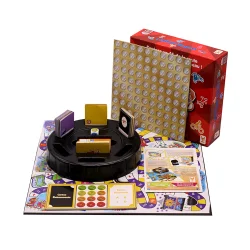Types of Board Games
2023-12-11
Board games come in a wide variety of types and genres, offering diverse gaming experiences to players. Here are some common types of board games:
1. Strategy Games:
- Strategy board games require players to plan and make tactical decisions to achieve specific goals. Examples include Settlers of Catan, Risk, and Ticket to Ride.
2. Party Games:
- Party board games are designed for large groups and emphasize social interaction and fun. Examples include Codenames, Pictionary, and Telestrations.
3. Family Games:
- Family board games are suitable for players of different ages and skill levels. They often combine simplicity with engaging gameplay. Examples include Monopoly, Scrabble, and Clue.
4. Cooperative Games:
- Cooperative board games require players to work together to achieve a common objective. Examples include Pandemic, Forbidden Island, and Ghost Stories.
5. Deck-Building Games:
- In deck-building games, players start with a basic deck and progressively build and improve it throughout the game. Examples include Dominion, Legendary: A Marvel Deck Building Game, and Ascension.
6. Worker Placement Games:
- Worker placement board games involve players assigning their pieces (workers) to various locations on the board to perform specific actions. Examples include Agricola, Lords of Waterdeep, and Stone Age.
7. Role-Playing Games (RPGs):
- RPG board games allow players to assume roles and engage in storytelling and character development. Examples include Gloomhaven, Dungeons & Dragons: Castle Ravenloft, and Descent: Journeys in the Dark.
8. Abstract Strategy Games:
- Abstract strategy games focus on pure strategy and typically involve minimal luck or theme. Examples include Chess, Checkers, and Go.
9. Tile-Laying Games:
- Tile-laying board games involve players placing tiles to create a board or modify the game environment. Examples include Carcassonne, Tsuro, and Isle of Skye.
10. Dexterity Games:
- Dexterity board games challenge players' physical skills, coordination, and reflexes. Examples include Jenga, Crokinole, and Klask.
11. Educational Games:
- Educational board games are designed to teach specific skills or knowledge while providing entertainment. Examples include Math Bingo, Scrabble, and Brainiac.
12. Card Games:
- Card games use decks of playing cards as the primary components. They can include various genres such as trick-taking games, shedding games, and collectible card games. Examples include Poker, Rummy, and Magic: The Gathering.
13. Eurogames:
- Eurogames, also known as German-style board games, often emphasize strategy, resource management, and indirect player interaction. Examples include Settlers of Catan, Carcassonne, and Puerto Rico.
14. Legacy Games:
- Legacy board games evolve over time as players make permanent changes to the game components, story, or rules. Examples include Risk Legacy, Pandemic Legacy, and Gloomhaven.
15. Wargames:
- Wargames simulate military conflicts and strategic battles. They often involve historical or fantasy settings. Examples include Axis & Allies, Twilight Struggle, and Warhammer 40,000.
These are just a few examples, and there are countless board games that combine elements from multiple genres to create unique and engaging gaming experiences. The board game industry continues to evolve, with new and innovative titles released regularly.



